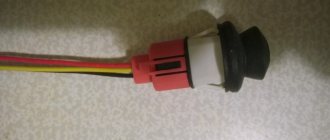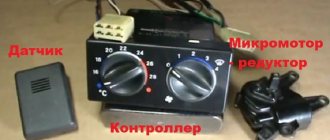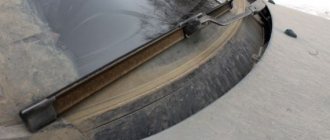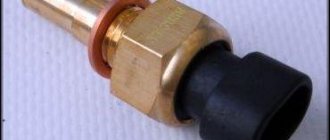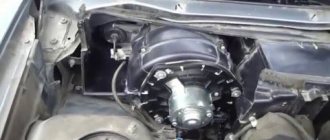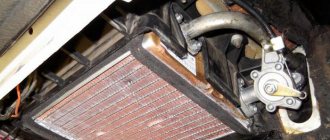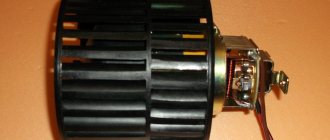Owners of domestic VAZ 2110, 11 and 12 cars unanimously claim that the stove in these cars is one of the most capricious and problematic units. Considering our frosty winters, you simply cannot do without a working stove in your car, and it breaks down quite often. Therefore, specialized experts recommend that if the heating system fails, immediately contact a car service center or restore the operation of the stove yourself.
Why the VAZ-2111 heater motor may not work
In cars of the 2110 family, ventilation is provided by a supply and exhaust system. Forced air from the fan enters through technological slots in the windshield and exits into the cracks between the upholstery fabric and the panel from inside the car doors. This design significantly improves air circulation and better warming up in winter. So why does it sometimes fail and how to resuscitate it? More on this below in the article.
VAZ 2110: heater control system and its features
VAZ heater system
In the VAZ 2110 car, the heater control system plays a rather important role. If it breaks down, the heater itself stops working correctly. It can heat up the interior too much, or, conversely, not warm it up at all. Therefore, at the slightest breakdown of the control system, it should be repaired immediately or replaced altogether, otherwise it will be impossible to regulate the heating intensity of the car’s stove. On the VAZ 2110, the heating control system can be adjusted independently.
Principle of operation
Due to the lack of a tap, the heating inside a domestic car is controlled by a hot air power damper. The adjustment is automatic, with an accuracy of two degrees Celsius. The damper has proven to be less practical than the faucet, as the latter can jam, stick or freeze. The main flow of heated or cooled air is evenly distributed throughout the cabin - first onto the windshield, and then passes through the deflectors closed with flaps to the side windows. The floor and footwells are heated using a similar principle. There is also an air recirculation system inside the cabin, which prevents an environmental disaster in the car due to unauthorized entry of outside air polluted and filled with road dust.
The stove fan of the tenth family operates in one of three modes: low, medium intensity and automatic selection. The mode depends on the number of additional 0.23 Ohm resistors in operation - one or two. Depending on the speed and air parameters, the digital control unit selects the optimal operating mode of a Soviet-style national air conditioner. The temperature is regulated using a controller. The driver can set the temperature in the range of 16-30 degrees with an interval of 2 degrees. Further, depending on the sensor readings, the fan begins to work with sufficient intensity to quickly warm up the air in the cabin, especially due to long periods of inactivity. In the first minutes after startup, the intensity of operation of the VAZ stove is quite high. Then it gradually decreases.
Design of the heating system VAZ-2110
It includes three main nodes. This is a control unit for the VAZ-2110 stove, an air duct system, and a heating unit. The stove is controlled via an electronic unit. It consists of knobs with which the driver sets the required temperature and fan intensity.
Another important component of the heating system is the air ducts. They pass directly from the stove itself, and each channel has its own separate function. Thus, the central channels are designed for interior ventilation.
The air distributor is responsible for supplying cool air to the cabin for ventilation or warm air for heating. The other two air ducts are designed to heat the interior in the back row. The rest are also intended for ventilation. Two side channels heat the mirrors and part of the interior. Separate nozzles are used to heat the driver's feet.
Possible problems
If the stove motor is not working well, do not rush to blame it. Of course, it tends to become clogged with extraneous small things - particles of dust, soot and other contaminants. It is enough to do preventative cleaning once or twice a season. Similar procedures must be carried out before the end and at the beginning of the operating season. The temperature sensor may fail. In this case, the movement of the damper is disrupted. In normal mode, it opens at the maximum when the red dot is reached and closes when the blue minimum point is reached. The indicators of normal resistance also differ. Typically the value is in the range of 20-25 ohms. If it goes beyond the limits, the fan may not heat or cool the air properly. A malfunction of the stove fan itself is indicated by unusual behavior. For example:
- Grinding noises during operation and extraneous noises;
- The fan does not start at all;
- Reduced efficiency and volume of air injection;
- I hear the fan is not working well.
The first place in the frequency of breakdowns is occupied by the electrical circuit from the battery to the stove motor. If the cable fails completely, a blown fuse is to blame. Malfunctions of the electric motor at different speeds hint at a blown resistor. And if there are no changes in the operating mode, the diagnosis is obvious - the control controller does not respond. The terminals of various connections may also fail. But if the electrical equipment is normal, then the device will have to be dismantled and thoroughly rebuilt.
How to check the cabin air temperature sensor?
To check whether the air temperature sensor on the ceiling has failed, you should take out its ends and apply a voltage of 1.2 V to the plus and minus terminals. In this case, if you set the controller knobs of the automatic heater control system to the “MIN” and “MAX” positions at the corresponding points (blue and red), then the fan should not rotate. Also, when the automatic control system is working, you can try to disable the cabin air sensor; in this case, mode “A” of the fan speed should stop working.
The procedure for repairing a stove fan
- Disassemble the heater motor. First remove the impeller, then the spring clips.
- Deprive him of support.
- Remove the brush assembly by unscrewing the screws first.
- Carefully knock out the rotor.
- Remove dust and dirt from all elements of the heater motor.
- Release the bearing by bending the edges of the plate on the inside of the stator.
- Remove the old bearing #609 and install the new one.
- Fold back the edges of the plate.
- Assess the condition of the plate after this procedure and sand the edges if necessary.
- Remove the old brushes along with the wires. In their place, solder the wires from the new brushes.
- Bend the brush spring stops to easily return the brush assembly to its place. Set it aside.
- Replace the heater motor rotor.
- Reinstall the brush assembly, making sure that the brushes are in their rightful places.
- Fill the gaps with springs and return the stops to their original position.
- Reinstall the impeller.
- Reconnect the electric motor to the stove network.
We are engaged in the drive
Simultaneously with replacing the damper, we check its drive, and if the MMR does not work, it is necessary to either replace the motor or repair it. After removing the trim and lining of the windshield behind the vacuum amplifier of the VAZ 2110, we find the MMR, disconnect two connectors - the MMR and the micromotor.
MMR new sample MMR old sample
Next, unscrew the screws and take out the MMR, from which we remove the motor. Its operation is checked by connecting to the automatic control system.
If you find that it is not working, you can replace it, but repair is also possible. The stages are:
- Partially bending the pressed side, remove the lid;
- Check the condition of the bearings, brushes and commutator;
- Replace or fix them. If the gear teeth of the gearbox are worn out, it needs replacement;
- Bearings require silicone grease.
If after repair the operation of the motor is restored, you can assemble the MMR and install it in place. In the VAZ 2110 this is done like this:
- The MMR lever pin must be inserted into the slot of the lever, which is located on the heater damper drive;
- If the indicated lever is turned incorrectly, you need to apply 12 V voltage with two wires to the contacts of the motor connector (yellow wires fit here), and the lever will move to the desired position;
- After installing the MMR, check how it works, at the same time, how the heater damper drive moves and the heater control lever works to set the temperature in the VAZ 2110 cabin.
https://youtube.com/watch?v=CuGGXakB5Ew
By properly repairing the heater damper and its drive, you will ensure that the operation of the stove becomes stable, providing you and your passengers with the proper level of comfort in cold weather.
The VAZ 2114 heater fan does not work for reasons.
Hello. If you start the car in severe frost or on a hot summer day, and the heater fan on the VAZ 2114 stops working and does not blow, do not be upset, as this problem can be quickly solved by reading this article. In order to understand the reasons why the stove fan may not work, let's first look at the electrical diagram for connecting the stove motor.
Heater fan diagram for VAZ 2114, 2115, 2113.
And so, here is a list of all components of the scheme:
- Mounting block (aka fuse block).
- Egnition lock.
- Ignition switch relief relay.
- Heater fan speed switch.
- Additional resistors.
- Stove motor.
- Rear window heating switch with warning lamp.
- Rear window heating element.
The scheme works as follows. When you turn the key in the ignition switch (2), its unloading relay (3) is turned on. The unloading relay supplies power to fuse f7 in the mounting block (1). After the fuse, power goes to the rear window heating switch (7) and the fan speed switch (4), which distributes which of the resistors (5) the power will go to next. Output 1 from the switch (4) corresponds to the slowest blowing speed, and output 3 goes directly to the heater motor (6), i.e. highest blowing speed.
The stove doesn't blow at all, what's the problem?
If the heater fails, you can do the initial fault diagnosis yourself.
Unfortunately, the complex heater control system has not proven itself as a device that allows you to take the hassle off the driver and automatically maintain the set temperature. Instead, we got a lot of trouble and cold interiors in the frost. Let's go from simple to complex and first let's look at the problems with the electric heater motor. Everything is more or less simple here:
- Fuse.
We turn on the stove, it doesn’t work. If we were lucky, the fuse had blown. Finding it is as easy as shelling pears, it is more difficult to find out the reason for its burnout. The 25-amp fuse F18 is located in the main mounting block; it also protects the circuit for the glove compartment lighting, heated rear window and is partially related to the cigarette lighter, so it is easy to diagnose its failure. And in order to find the short circuit that caused it to burn out, you will have to call all these circuits - the glove compartment light, the rear window heating, the headlight washer and the cigarette lighter. Heater fuse location. - Contacts.
A very common occurrence on the VAZ 2110 is the lack of contact on the heater control unit or on the electric motor itself, there is no contact on the power wire on the automatic control system. You will have to go through and clean all these contacts. We check the contacts on the heater control unit and the electric motor. - Stove blower. The electric motor of the stove also does not last forever and can either simply burn out or fail for another reason. To check its operation, we get to its power supply contacts and measure the voltage. If we record 12 V at the engine input, the problem is in the engine. The brushes may be worn out or burnt, the motor commutator may have burned out, or the winding may have burned out or shorted out. In any case, no one will bother with it, we’ll just replace the electric motor with a new one.
Checking the automatic heater control system
The stove control system can also give out surprises. They consist in the fact that one of the speeds may not work, several, or only one, the most powerful, may work. At the same time, the SAUO block is not universal and is selected depending on the year of manufacture of the car:
One of the reasons for the failure of the stove may be the unit of the automatic heater control system.
- 2110-8128020-03, price 2300 rubles, used in the last ten years of production;
- 21102-8121020, price 3100 rubles, installed on cars with air conditioning;
- 2110-8128020-02, about 2 thousand, set for the first ten years of production;
- 2110-8128020-01, 1840 rubles, used on some cars before the year 2000.
Problems with the heater fan from the electrical part.
In this section, we will consider the circuit to the VAZ heater fan by components.
Fuse.
Let's follow the scheme given at the beginning of the post. If your heater fan does not work together with the heated rear window, then the problem is 100% in the fuse. Check fuse f7 in the mounting block, if it is ok, then use a multimeter to see if the plus is coming to it from the ignition switch unloading relay. To do this, with the ignition on, place one multimeter probe on the fuse and the other on the car body. If everything is in order, look at the circuit from the fuse to the speed switch and the heating switch.
Heater fan speed switch.
We figured out the fuse - let's move on. And then we have the stove motor speed switch. To check it, remove the connector from it. The connector has three inputs nearby and one is located, as if separately from them. We connect any of these three inputs with a wire to the one that stands separately. If the motor starts working, then the speed switch is to blame; if not, we move on.
Additional resistors.
If the fan works, but only at the third (fastest) speed, then the additional resistors are to blame. In the third mode, power is supplied directly to the fan, bypassing additional resistors, so it does not work in other modes.
Heater motor VAZ 2114, 2115, 2113.
If checking all the components listed above shows they are working, the reason is in the stove motor itself. Most likely it is burned out or has a bad mass. To check, we remove it (read how to do this here) and connect it directly to the battery (the black wire screwed to the body is a minus). If it works, it's a bad mass. If it doesn't work, we change the motor.
If you find an error, please select a piece of text and press Ctrl+Enter.
Replacing self-propelled guns
Control units cannot be repaired - they are simply replaced with new ones. But first you need to make sure that this mechanism is the reason. Instead of a broken one, install a working control unit. Its price is about 1500 rubles. The element is very easy to dismantle: just remove the buttons installed nearby. And then you can remove the device. The handles are set to zero positions and then removed.
How to diagnose a problem with the heater motor assembly (heater fan)
The most common causes of failure of the heater fan (heater electric motor assembly) in a car of the VAZ 2108-2112 family; 2113 – 2115, VAZ -2120 and their modifications produced before 2003?
The design of the heating system on the “ten” is fundamentally different from what was on the old VAZ models. The most important feature and difference of the interior heater is that the VAZ 2110 heater radiator and its fan are located not in the cabin, but in the engine compartment. This design has its advantages, for example, to replace the heater radiator or stove fan, you do not need to completely disassemble the front panel (dashboard).
Another important difference is the electronic control of climate processes in the cabin. For this purpose, the VAZ 2110 is equipped with a so-called automatic heater control system (AHC).
The SAUO unit on the VAZ 210 of different years of manufacture is different. Since 1996, 4 types of SAUO controller have been produced. It is worth taking this into account when purchasing a unit as a spare part. It is this device that controls the temperature in the cabin and the operation of the fan. You can set the temperature from 16 to 28 degrees.
Dear customers, in order to avoid errors when sending an automatic heater control system (AHCS), indicate your car model and year of manufacture in the “Comment” line.
The heater fan does not turn on - it’s very easy to understand: with the car running, turn on the heater at speed. If no additional “noise” appears, then the fan does not turn on. Let us immediately note:
– for VAZ 2108 – 21099; 2113-2115 and their modifications, if the fan does not turn on at speed 1-2, but does turn on at speed 3, then the problem is in the additional resistor or in the heater operating intensity switch.
- for VAZ 2110-2112 and their modifications and their modifications produced before 2003, if the fan operates only in one position 2, an additional resistor on the heater body has burned out, which allows you to regulate the speed - the fan is connected through it in position “A” and 1 .
The main reasons why the heater fan does not work
1. The fuse has blown. The simplest and at the same time the most unpleasant malfunction, because replacing the fuse (active link going to the fuses basket) is very simple, and at the same time, we do not know the reason why it blew.
If the fuse blows, it means there is a short circuit somewhere (short circuit). In this case, you need to go through the entire fuse circuit and look for the source of the short circuit.
A fuse F7 with a current of 30A is attached to the stove. This fuse is also responsible for the cigarette lighter, headlight washer motor, glove compartment light, and heated rear window. So, if a fuse blows, then in addition to the heater fan, the above-mentioned electrical elements of the car will stop working.
2. Poor contact in the mounting block. Poor or oxidized contact in the mounting block is also a common disease. In this case, you need to move the block of flagella going to the mounting block.
3. The ignition relay is stuck. If your heater turns on only when warm, then the problem is in the ignition relay. It’s surprising, of course, how the ignition relay affects the operation of the stove, but the fact remains a fact. The relay needs to be replaced. By the way, it is located under the instrument panel in the center console.
Diagnostics of the heater regulator
Central nozzles
To quickly determine the real cause of the breakdown of the faulty VAZ heater temperature regulator of the tenth family, the first step is to disassemble the central nozzles. In this case, the handle that regulates the direction of the air flow must be placed in the extreme left position. To monitor the operating efficiency of the damper, you should activate the ignition and change the position of the temperature sensor from minimum to maximum (move from the blue dot to the red).
If upon inspection it turns out that the damper is frozen in a stationary state and does not move, it means that the small-sized gearmotor of the heater damper (stove) is jammed in the car. If everything is in order with the gearbox, you need to check whether the device socket is broken. Such breakdowns constantly plague units in which the dampers are made of plastic.
Clogged tubes
Often the breakdown of the temperature regulator occurs due to clogged tubes, which are constantly clogged with all kinds of deposits and sealant. In this case, the car owner needs to check the amount of coolant in the expansion tank.
A low level of antifreeze or antifreeze directly indicates that the substance used is not enough to reach the heater.
To activate the damper (if it is stationary), the gearbox is activated by starting the ignition. You can also try to revive the damper manually.
Damper position sensor
Repair work with the heater regulator of the VAZ 2110, 2111 and 2112 cars is also necessary in the case when the heater operates only in extreme positions. This problem appears when the gearbox operates in standard mode and the shaft itself rotates. In this case, you need to check for faults in the sensor that ensures the correct position of the damper. By changing the position of the temperature switch, the car owner will notice a sharp change in the contact resistance.
A rotating (floating) gearbox shaft and lack of resistance indicate a breakdown of the damper location sensor. In this case, repair is impractical; it is recommended to install a new device.
If everything is done correctly, the control unit controller will begin to operate normally, and the gearmotor will restore its control voltage.
What tools should be used for diagnosis?
You can check the power supply to the engine connector with a regular test. But when carrying out full diagnostics and identifying faults of a high degree of complexity, a multimeter is needed. If you have knowledge of using a multimeter, you can easily measure the power on the connectors and check the resistance, which will make it possible to quickly troubleshoot wiring problems or identify problems with resistors.
In addition, measuring resistance and diagnosing wires in this mode will greatly facilitate the search for a short circuit.
You can diagnose PWM controllers for electrical systems that control fan speed using an oscilloscope. But purchasing this device for diagnostics is not advisable due to its high cost.
Isn’t it better to use the diagnostic methods listed below, which in most cases will help identify the sources of malfunctions in the stove fan without expensive equipment. So let's get started.
If it is impossible to start the fan , this situation occurs due to:
- worn brushes. When performing the functions of a conventional DC motor for a stove fan, the main problem is the abrasion of the brushes, with the help of which voltage is supplied to the commutator. With strong abrasion of the copper-graphite brushes, the pressing spring force that creates the contact is reduced, which in turn leads to the fan operating at a variable frequency. For example, it turns on when you hit the front panel or hit potholes in the road.
- faulty electrical control circuits. The source of the problem is contacts that have been sealed off due to strong heating;
- break in wires, oxidized contact;
- blown fuse element. If a fuse constantly blows (after replacing it), the technician must find a section of the circuit with a short circuit.
Determining the cause of the malfunction and eliminating it
Problems with the stove may occur for the following reasons:
- Coolant is leaking. Due to its lack, the cooling system does not work correctly, including the stove. In this case, a malfunction is observed only during a decrease in temperature. To resolve this problem, you should check the fluid level in the appropriate tank. If it is less than the Max mark, then you should top it up.
- The heating radiator may be faulty. To determine if it works, you need to touch it. As a rule, during the heating process it becomes warm or even hot.
- There may be an air lock in the system. To get rid of this problem, you should make sure that the front wheels are slightly higher than the rear ones. Turn on the engine and leave it like that for a few minutes.
- The heater may be leaking in some places. In this case, its complete replacement is necessary, since it will not be possible to eliminate this problem through repair.
- If the stove “blows weakly,” then the problem may be in the cabin filter. It should be changed.
Note: If you want the filter to remain operational as long as possible, you should install a guard on the air intake.
- It is possible that the controller is not working. The solution is to completely replace it.
- In addition, the heater damper may not always switch on time. Therefore, sometimes instead of warm air there can be cold air and vice versa.
Replacing any part will not be difficult. Typically this process takes no more than 5 minutes. However, a problem may arise during the process of replacing the micromotor gearbox. In this case, you will have to remove the frill, as well as the sound insulation of the engine shield.
Possible problems with the damper
As noted earlier, the stove has several dampers. However, problems can only arise with one of them. To determine which one is faulty, diagnostics should be carried out.
- Pay attention to how the damper moves when switching temperatures. If you hear extraneous sounds during this process, then there is a problem with the damper.
- If cold air blows normally, but hot air does not, then the problem is with the lower damper. At the same time, if hot air flows normally, but cold air does not, then the problem is with the upper damper.
You can determine the causes of problems in the car’s heating system with your own hands, since such work is not at all difficult to do even at home. However, the cost of repairs may vary. After all, several different parts often need to be changed. Sometimes, on the contrary, you just need to clean certain parts from dirt. Of course, before starting repairs, it is worth reviewing photos and videos on this topic. Instructions wouldn't hurt either. In addition, you can use the questions/answers section on many Internet sites.
Self-diagnosis of stove malfunction
If the safety elements are intact, you need to check how efficient the fan is by first opening its power supply connector. The electric motor in the stove is located either in the space under the hood (behind the engine shield near the passenger compartment), or under the dashboard of the car interior.
The location of the heating fan and how to open it are in the vehicle operating instructions. There is also a circuit for starting the fan.
When studying the circuit, you need to find out which of the connector pins of the electric motor is positive when starting the first speed of the fan. Next, any contact of the control device is connected to this pin, another of its contacts is shorted to ground, the ignition system is turned on and the fan switch is turned to any position. If the control lamp turns on, then the cause of the fan malfunction is the electric motor. Otherwise, fan malfunctions occur due to a break in the wiring leading to the heating switch.
Removing the temperature controller
To repair or replace the stove temperature regulator, you need:
- Unscrew and move to the side one of the climate dampers located under the steering wheel of the car.
- Next, the pedal assembly, consisting of the brake pedal and gas pedal, is dismantled. The wiring harness is disconnected from the assembly, and the connectors are disconnected from the pedals.
- Two connectors are unfastened from the heater regulator, and its contacts are diagnosed - maybe they are oxidized or burnt.
- At the final stage, the temperature regulator is unscrewed, which is held on by a pair of screws.
This completes the work on removing the regulator.
The main reasons for the failure of the stove fan
There are many more reasons for failure, they arise for a variety of reasons, we will look at the most basic causes of failure, which even an ordinary car enthusiast who is not involved in professional repairs can eliminate.
The stove brushes are worn out or damaged
In such a situation, you need to disassemble the stove motor and be sure to replace the brushes. To do this, the impeller wheel is removed from the electric motor housing (it is usually secured with latches). If the catalog of automobile spare parts does not contain the necessary brushes, then you can unsolder the old analogues and replace them with identical ones in size. As a last resort, graphite-copper brushes are filed using a needle file.
Design Features
For the VAZ 2110, it is possible to install two types of stoves - new and old. Regardless of the engine used (injection or carburetor), there are no fundamental differences in the designs of the stoves.
But what is the difference between the new and old type stoves? Let's try to figure it out.
- Radiator design. This is the main difference between the devices. Therefore, when replacing a radiator from an old one to a new one, be sure to take into account the installation nuances;
- The controller knob on stoves is slightly different. Old-style heaters have a main problem - they have been discontinued. They cannot be an analogue for 4 and 5 position controllers, which began to be equipped with dozens of them in the fall of 2003;
- The micro-gear motors for the stoves are different, starting in September of the same 2003. The difference lies in the shaft position sensors (resistors). Therefore, when making repairs, make sure that the devices are truly interchangeable and that you bought old-style resistors for your old stove, not new ones. Otherwise the gearmotor will not work.
The fan of the VAZ 2107 stove does not work.
Hello. This time I will write about possible reasons why the heater motor on a VAZ 2107 may not work. These reasons can also be attributed to other classic models such as VAZ 2105, 2106, 2101, 2103, 2104.
To check all possible malfunctions, you need to have at least a test lamp, or better yet, a multimeter.
If you find out that it is the heater motor that has broken down, then read the article “Replacing the heater motor in a VAZ 2107.”
To understand what can break and why the VAZ 2107 heater fan may not spin, you need to consider the electrical circuit for powering this motor.
Leaks
It is not uncommon for the stove to heat poorly due to the fact that the fluid level drops. Be sure, before adding antifreeze, check all the pipes very carefully, especially to see if there are any leaks at the fastening points. But if the heater radiator is leaking, then it must be removed.
Repair is possible, but if replacement is necessary, when choosing a radiator, you should know that aluminum is lighter and cheaper, but copper heats up faster and better, but is heavier and more expensive.
After replacement, be sure to check for leaks from the radiator, as well as at all connections.
Another fairly common “disease” of the VAZ 2110 associated with the stove is that it is very noisy. This doesn’t interfere with the flow of heat into the cabin, it’s annoying, and you expect: something is about to break.
- if the noise is sharp, even “squealing,” the lower part of the heater, which is attached to the hooks, may have come unfastened;
- sometimes it is necessary to replace the stove body if the protrusions that hold the latch are broken;
- The fan is noisy. It needs to be dismantled, cleaned, and its electric motor inspected;
- The textolite washers hum, eliminating the axial play of the fan. You can use washers made from fluoroplastic or other material that provides the least friction to replace them. It is better to lubricate the washers additionally. Some craftsmen use machine oil for lubrication. This helps, but not for long because it is fluid. It is better to use a thick lubricant such as lithol, graphite, etc.
Connection diagram for the VAZ 2107 heater fan.
The diagram below shows how the stove fan (4) . Power from the battery, through the mounting block (1) , goes to the ignition switch (5) and again goes to the mounting block (1) . In the mounting block (1) it passes through fuse F1 (10 amperes) and goes to the stove speed switch button (2) . Next, power from the button goes either through resistance (3) to the motor (4) , or directly to the stove motor (4) .
The VAZ stove fan will not work if any of its circuit components is faulty. You can determine the reason why the VAZ 2107 heater fan does not work:
- There is a fault in the mounting block.
- The contacts of the heater fan speed switch are burnt out.
- The speed control resistance has burned out.
- There is a malfunction in the heater motor itself.
Let's take a closer look at each of the faults.
There is a malfunction in the VAZ 2107 mounting block.
If the stove stops blowing air, then first of all look to see if fuse F1 in the mounting block is intact. Usually, if this fuse blows, then the heated rear window and reverse lights stop working along with the heater. This fuse must be rated 10 amps . No more and no less. If you install a fuse of less than the nominal value, it will constantly burn out, and if you install a fuse of a higher nominal value, it is possible to burn the mounting block. If you have a fuse of a higher rating (as in the photo below), then the likelihood increases that the mounting block has failed and the plus is not supplied to the speed shift button. How to find out, read the next paragraph.
The contacts of the heater fan speed switch are burnt out.
You checked the fuse and saw that it was intact. Let's dig further. Now we take and remove the gear shift button from the panel and disconnect the wires from it. Afterwards, we reliably one end of the indicator light to ground, and alternately insert the other end into the removed terminals of the wires disconnected from the button. must be on !
If the light does not light up, then power is not supplied to the speed switch and the mounting block is most likely faulty.
If the light comes on when testing one of the contacts, it means either the button or something else is faulty. How to find out? Very simple! To do this, we make a jumper from a regular wire, from the contact, during the test of which the indicator light came on, to one of the other two contacts. The stove motor will work if the button is faulty. If the motor does not work, then it is the motor that is faulty.
The stove only works at one speed VAZ 2107.
When the stove operates only at the highest speed, this means that the ballast resistance has burned out.
In this case, just change it. It is located under the dashboard approximately in the middle, closer to the driver's side.
There is a malfunction in the heater motor itself.
Before disassembling the panel and stirring up the interior, check whether the mass going from the heater motor to the body sits well. It often happens that this wire simply rots.
If you have a multimeter, you can ring it. To do this, take out the speed switch button and disconnect the contacts from it. Now, in the continuity mode, connect one probe of the multimeter to ground, and check the wires with the others one by one. If the motor and ballast resistance are working properly, the multimeter will beep when checking two of the three wires. If the ballast resistance is faulty, then the multimeter will beep when checking one of the three wires, and if the heater motor does not work or does not have contact with ground, then the multimeter will be silent.
If you want to learn how to replace the stove motor, read this article!
I hope you found this article useful. If you have any questions or comments, leave them in the comments.
Checking the resistance resistor
The stove resistor has 2 spirals, the resistance of the 1st is 0.23 Ohms, and the 2nd is 0.82 Ohms. When both are activated, the heater electric motor operates at the first speed, but if the resistor operates at the first spiral, then the 2nd speed is activated. At the third, maximum fan speed, when the resistor is not used. When the electric motor is turned on without a resistor, the fan rotor rotates at the maximum 3rd speed.
In addition to the above malfunctions, the stove may also not work due to a low level of antifreeze, air in the cooling system, or a non-working thermostat or pump.
How to check the serviceability of the SAUO controller
To check the automatic control system, you will need a multimeter to measure the voltage on the pink and brown wires (turn on the ignition and turn the temperature knob). Depending on which controller is installed on the car, the voltage changes differently. On cars before 2001, a heater control controller 1303.3854 was installed; its voltage in the “min” position decreases after 13 ± 5 seconds, and is constantly supplied to o. Thus, when the output voltage of the ACS unit does not change, it is not working. On cars after 2003, block 1323.3854 and stove 2111-8101012 were installed.
When the controller malfunctions, the dampers may not work , but in order to diagnose other causes of malfunction of the VAZ 2110-12 heater, you will have to disassemble the heater.


